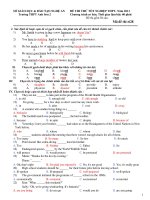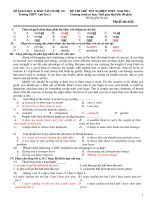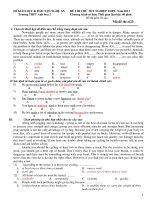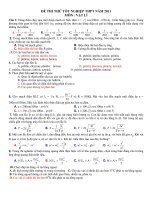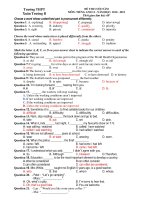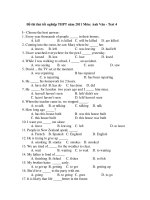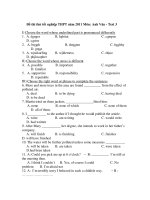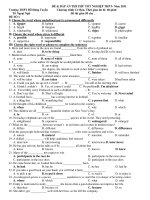ĐỀ THI THỬ TỐT NGHIỆP THPT NĂM 2011 TRƯỜNG THCS-THPT NGÔ GIA TỰ Môn thi: Tiếng Anh - Đề 1 pptx
Bạn đang xem bản rút gọn của tài liệu. Xem và tải ngay bản đầy đủ của tài liệu tại đây (107.81 KB, 6 trang )
SỞ GIÁO DỤC & ĐÀO TẠO LÂM ĐỒNG ĐỀ THI THỬ TỐT NGHIỆP THPT
NĂM 2011
TRƯỜNG THCS-THPT NGÔ GIA TỰ Môn thi: Tiếng Anh - Đề
1
HỌ VÀ TÊN THÍ
SINH: LỚP:…………………
Mark the letter A, B, C, or D on your answer sheet to indicate the word whose underlined part
is pronounced differently from that of the rest in each of the following questions:
Question 1: A. laughed B. watched C. missed D.
wanted
Question 2: A. educate B. continue C. refuse D.
successfully
Question 3: A. leave B. peace C. search D.
mean
Question 4: A. with B. thank C. the D. this
Question 5: A. pens B. books C. tables D.
walls
Mark the letter A, B, C or D on your answer sheet to indicate the correct answer to each of the following
questions:
Question 6: The furniture was .
A. such expensive that I didn't buy it B. enough cheap for me to buy
C. so expense that I did buy it D. too expensive for me to buy
Question 7: She speaks Chinese as as I do.
A. well B. better C. very good D. good
Question 8: They have to do better than that the gold medal.
A. in order win B. winning C. so that to win D. to
win
Question 9: It is wrongly believed that natural resources will never be .
A. used out B. used up C. used off D. used
away
Question 10: Smoking is a great to our health.
A. harmless B. harm C. harmful D.
harmness
Question 11: She has worked as a secretary she graduated from college.
A. until B. before C. while D. since
Question 12: if you take a map.
A. You won't get lost B. You would have got lost
C. You'll get lost D. You would get lost
Question 13: Her mother was sick. __________, Jane had to stay at home to look after her.
A. but B. However C. so D.
Therefore
Question 14: He drank _______wine last night and gets sick now .
A. too many B. few of C. large number of D. too
much
Question 15: I’ll wait here until you _____ .
Marks
A. returned B. will return C. are returning D. return
Question 16: We _____ up early to prepare our lessons.
A. are used to have got B. used to getting
C. are used to get D. are used to getting
Question 17: . Value Added Tax has been reduced by 2 % _____ stimulate the economy.
A. in order for B. so that C. in order that D. in
order to
Question 18: Let’s go to the next part, ____?
A. shan’t we B. won’t we C. shall we D. will
us
Question 19: If she _____ more polite, she ___ less trouble.
A. had been/ would have B. was/ would have met
C. were/ hadn’t had D. were/ would have
Question 20: Speak to him slowly ____ he can understand you better.
A. since B. although C. so that D.
because
Question 21: What about ____ for a ride?
A. to go B. go C. going D. have
gone
Question 22: Children are ____ to overcome problems.
A. determination B. determine C. determined D.
determinative
Question 23: No longer _____ any pleasure to do this joB.
A.I do have B.do I have C.do have I D.I have
Question 24: Will you inform me _________?
A. when he leaves B. when does he leave
C. when did he leave D. when he does leave
Question 25: I can’t ride my bicycle …… there isn’t any air in one of the tires.
A. despite B. because C. although D. but
Question 26: We arrived …… to have some coffee before class.
A. enough early B. early enough C. too early D. early
too
Question 27: Mary:”Are you going by boat?”- Peter: “If John does, _________”
A. I do so B. I do too C. so will I D. will
I too
Question 28: Mary:
“I’ve passed my driving test.” -
Peter:
“
_________
”
A. Do you? B. Congratulations!
C. It’s nice of you to say so. D. That’s a good ideA.
Question 29:
“Would you like to have dinner with me?” - “ .”
A. I’m very happy B. Yes, so do C. Yes, it is D.
Yes, I’d love to
Question 30: Peter: Good morning, Mr. Brown. How are you?
Mr. Brown: _________
A. So long B. Not bad. You?
C.Morning, Peter. And you? D. I’m fine, thank you
Mark the letter A, B, C or D on your answer sheet to indicate the correct answer to each of the
following questions:
Question 31: People said that he was in London last summer.
A.He is said that he was in London last summer.
B.He was said that he was in London last summer.
C.He was said to be in London last summer.
D.He was said being in London last summer.
Question 32: “Where are you spending your holiday?” Janet asked us.
A. Janet asked us where are we spending our holiday.
B. Janet asked us where we are spending our holiday.
C. Janet asked us where were we spending our holiday.
D. Janet asked us where we were spending our holiday.
Question 33: “John began playing the piano four years ago.” Means:
A. John has played the piano for four years.
B. John used to play the piano four years ago.
C. John played the piano four years ago.
D. John doesn’t play the piano any more.
Question 34: I spoke slowly. The foreiners could understand me.
A. I spoke slowly so that the foreiners could understand me.
B. I spoke slowly in order to the foreiners could understand me.
C. I spoke such slowly that the foreiners could understand me.
D. I spoke slowly to make the foreiners could understand me.
Question 35: There will be a shortage of water unless it rains.
A.If it doesn’t rain, there will be a shortage of water.
B.There will be a shortage of water if it rains.
C.There will be a shortage of water if it will rain.
D.If it doesn’t rain, there would be a shortage of water.
Mark the letter A, B, C or D on your answer sheet to show the underlined part that needs
correction.
Question 36: The children are very boring and they don't know what to do.
A B C D
Question 37: No one in our office wants to drive to work any more because of there are always
traffic jams at rush hour. A B
C D
Question 38: The doctor advised doing exercise, drinking milk and not to smoke.
A B C D
Question 39: The most you learn, the more knowledge you get.
A B C D
Question 40:They asked me how long did it take to get to Paris by train.
A B C D
Read the following passage and mark the letter A, B, C, or D on your answer sheet to indicate
the correct answer to each of the questions form 41 to 45:
If you are invited to an American friend’s home for dinner, remember these general rules
for polite behaviour. First of all, arrive approximately on time but not early. Americans expect
promptness. It will be all right to be 10 or 15 minutes late but not 45 minutes late. Dinner might
be over-cooked and ruined by then. When you are invited to someone’s home for a meal, it is
polite to bring a small gift. Flowers or candy are always appropriate. If you have an attractive
thing made in your native country, your host or hostess
will certainly enjoy receiving that gift. What will you do if you are served some food that you
cannot eat or you do not like? Do not make a fuss about it. Simply eat what you can and hope that
no one notices it. Be sure to compliment the cook on the food that you are enjoying. Do not leave
immediately after dinner, but do not overstay your welcome, either. The next day, call or write a
thank-you note to say how much you enjoyed the evening.
Question 41: When an American invites you to have dinner at his home _________
A. you needn’t arrive on time
B. you should arrive late to show that you are polite
C. you should arrive on time
D. you should arrive early to help the host.
Question 42: When you come to someone’s house for a meal
A. do not bring anything with you .
B. take some food or drink
C. do not care about gifts
D. bring some flowers, candy or something made in your native country
Question 43: If you are served some food that you cannot eat _________
A. immediately tell the host about this B. do not make fuss about it
C. ask for another dish D. apologize for being unable to
eat
Question 44: After dinner, _________
A. do not leave immediately or do not overstay your welcome
B. do not say anything about the cook .
C. leave immediately
D. stay there until bed-time.
Question 45:The next day _________
A. immediately invite him to your home. It is your turn.
B. remember to thank the host for the dinner
C. you do not need to thank
D. write a letter to invite him to your home.
Read the following passage and mark the letter A, B, C, or D on your answer sheet to indicate
the correct word for each of the blanks from 46 to 50.
We can (46) __________other people in many different ways. We can talk and write, and
we can send messages with our hands and faces. There is also the phone (including the mobile!),
the fax, and e-mail. Television, film, painting, and photography can also communicate ideas.
Animals have ways of (47) __________ information, too. Bees dance and tell other bees where to
find fooD. Elephants make sounds that humans can’t hear. Whales sing songs. Monkeys use their
faces to show anger and love. But this is nothing (48) __________ to what people can do. We
have language – about 6,000 languages, in fact. We can write poetry, tell jokes, make promises,
explain, persuade, tell the truth, or tell lies. And we have a sense of past and future, not just
present.
Radio, film, and television (49)_________a huge influence on society in the last hundred years.
And now we have the Internet, which is infinite. But what is this doing to this? We can give and
get a lot of information very quickly. But there is (50) __________ information that it is difficult
to know what is important and what isn’t. Modern media is changing our world every minute of
every day.
Question 46: A. talk to B. talk with C. communicate to D.
communicate with
Question 47: A. changing B. transferring C. exchanging D.
giving
Question 48: A. compare B. comparing C. is compared D.
compared
Question 49: A. have B. have had C. are having D. had
Question 50: A. so much B. such much C. so many D. too
much
HẾT
